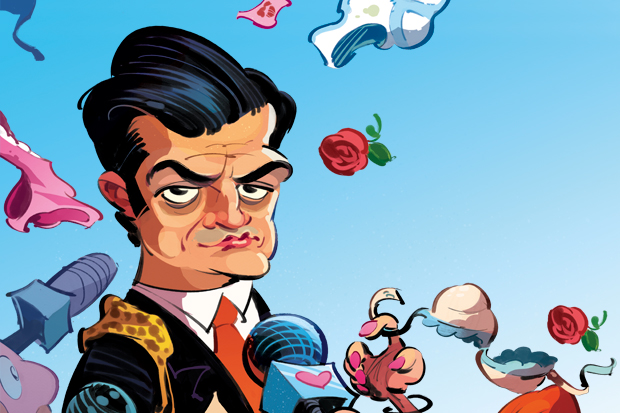Sam Dastyari’s ‘Chinese indiscretion’ hit the press on Tuesday of the first week of parliament. It was immediately followed by a long pause from the Senator, silence from the ALP and only passing interest from the media (with a few honourable exceptions).
The delay was later attributed to Malcolm Turnbull’s unwillingness to distract from the government’s agenda in the first week.
But why would the Prime Minister’s tactics inhibit the instinctive curiosity of the free press? Once Cory Bernardi raised the allegations in parliament, it became a matter of public record. It was out in the open. Journalists had a responsibility to investigate.
They didn’t. Distracted and confused by the sight of a bad guy (Bernardi the Antichrist) attacking the good guy (Dastyari the Hanson-baiting Labor Senator) the media chose to politely look away. More attention was given to the juvenile response of Jaqui Lambie who likened Bernardi to ‘an angry prostitute lecturing us about the benefits of celibacy.’
No one picked up on the key issue, no one was interested in the propriety of a politician hitting up a Chinese businessman for $1,670 in travel costs.
This initial reluctance to pursue a clearly massive story stopped Bill Shorten and Dastyari in their tracks. Was it possible? Could it really be true? With a bit of luck, and a little more distraction, the media might overlook the whole sorry affair. It could possibly sink without a trace.
Dastyari went to ground, Shorten buttoned his lips and opposition members were advised to wait to see how the issue ‘played out’.
The Labor PR machine turned up the volume on counter-protests about Liberal hypocrisy, fake Chinese watches and ‘the bigger picture of donation reform’. There were suggestions that the poor Senator had simply made an innocent stuff-up and was being pursued over a paltry amount of money by nasty, vengeful right-wingers. But the whiff of scandal wouldn’t go away. Finally, when Greens leader, Richard di Natale, joined in, it could no longer be dismissed as a nasty right wing conspiracy.
It wasn’t until a week after the revelations that we finally heard widespread condemnation of Dastyari’s actions. In a typical show of groupthink, the media simultaneously, unanimously and belatedly concluded that the Senator’s actions were completely out of line.
This collective error of judgement by the Canberra press gallery highlights the increasingly cosy relationship between many politicians and reporters. Those who report from ‘inside the beltway’ are so removed from reality, so chummy with political players, that they dismissed the Senator’s baffling financial arrangements with a Chinese company as a bit of a joke.
‘Sam’s stuff-up’ was mentioned alongside other frivolous events of the first week of parliament, including Senator Hinch’s snooze and the fashion faux pas of the Midwinter Ball. Over on ABC radio station Triple J, the response was a comfortable ‘what-evs’ about the whole thing.
Dastyari is known as a media darling – a flamboyant, entertaining, populist and melodramatic political figure.
He gets along well with the Canberra press gallery, including veteran political reporter Malcolm Farr. On ABC’s Insiders programme, a few days after the revelations, Farr joked about an ‘exclusive’ interview he’d had with the Senator.
Farr had crossed paths with Dastyari in the hallways of Parliament House not long after the scandal hit the headlines,
‘Sam, Sam, Sam,’ said the journalist with a shake of his head.
‘I know, I know,’ responded Dastyari, sauntering off.
And that was it.
This glib interaction – which Farr recounted to much laughter – summed up the press gallery’s interest in pursuing the story.
The whole shemozzle is evidence not only of the hypocrisy of politicians, but the fact that journalists are so busy hobnobbing with these quasi-celebrities that they don’t have time to dig up the truth and ask challenging questions.
Today’s journalists are more likely to be minor celebrities, mixing sociably with parliamentarians, tweeting to thousands of followers, and collating anecdotes for a gossipy tell-all book or a fringe comedy show.
Plenty of them have won niche spots on increasingly light-hearted, information-free television shows.
The absurdity of this position was pointed out a couple of years ago by visiting US writer and journalism professor Jay Rosen. How did Australia get to the point, Rosen asked, ‘where it seems entirely natural for the ABC to describe political journalists appearing on its air as “the insiders”?’
Very few journalists have predicted the twists and turns of Australian politics in recent years. Their proximity to their heroes leaves them not only deaf to the electorate, but unable to make glaringly obvious connections.
Real journalists would be trying to fathom the way in which political manoeuvrings play out in the electorate. But this task seems beyond the abilities of current political analysis.
Monitoring the opinions of ordinary Australians requires a bit of initiative and a lot of leg work. These insights are not gleaned from poll results, texts on the ABC’s Q&A programme or jokey chitchats with politicians.
They come from asking hard questions, getting out in the real world, and getting a feel for the depth and diversity of public opinion.
Political journalists – especially the Canberra press gallery – have abandoned their former tools of trade. It’s clear that they reside in a cloistered world, as removed from everyday life and the mood of the ordinary public as many of our politicians.
The post Journos or Groupies? appeared first on The Spectator.
Got something to add? Join the discussion and comment below.
Get 10 issues for just $10
Subscribe to The Spectator Australia today for the next 10 magazine issues, plus full online access, for just $10.
You might disagree with half of it, but you’ll enjoy reading all of it. Try your first month for free, then just $2 a week for the remainder of your first year.














Comments
Don't miss out
Join the conversation with other Spectator Australia readers. Subscribe to leave a comment.
SUBSCRIBEAlready a subscriber? Log in